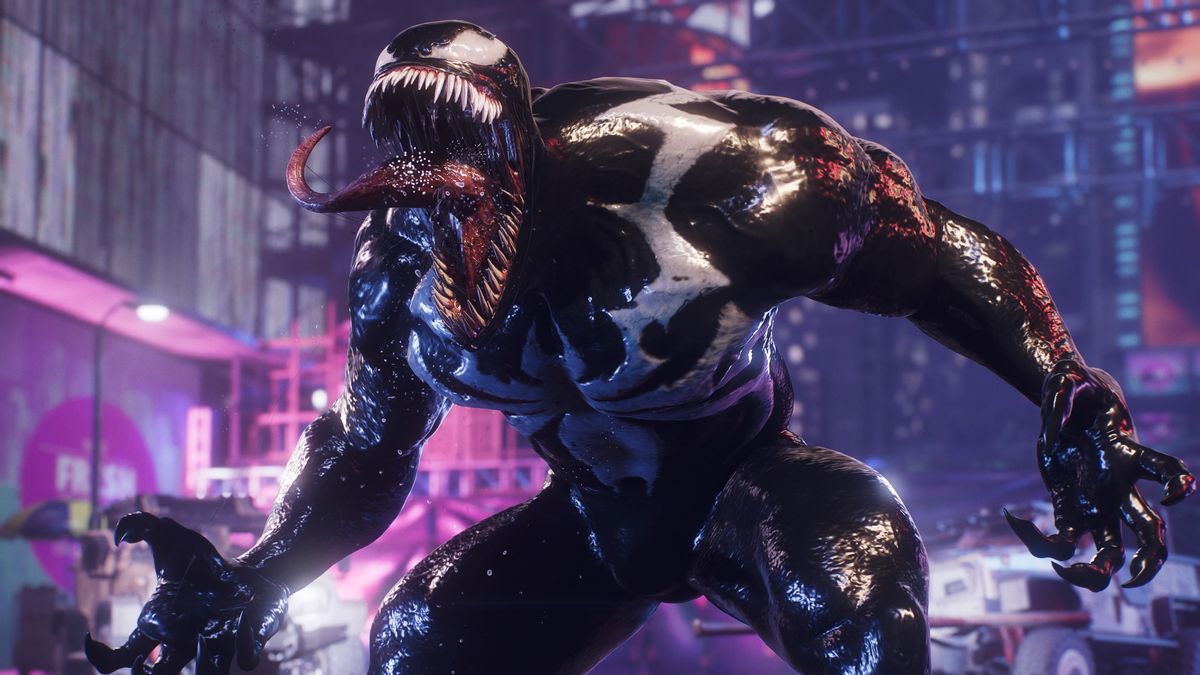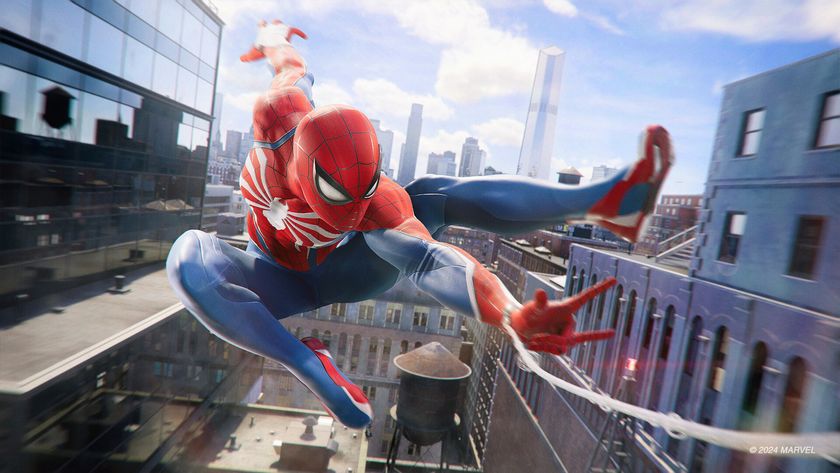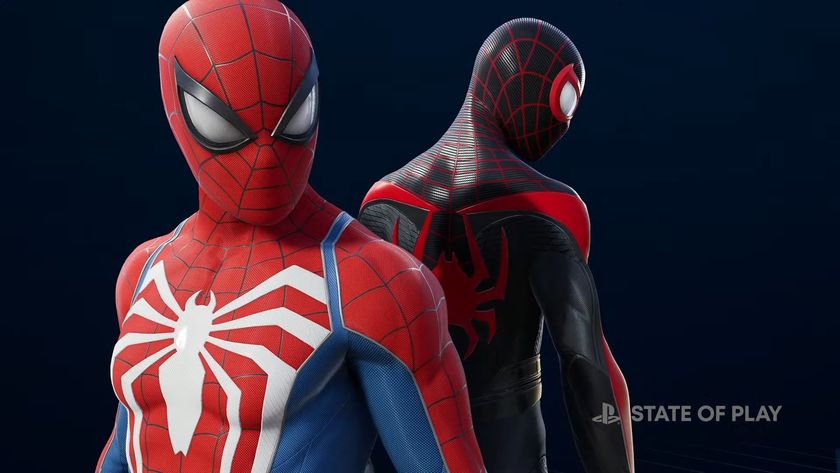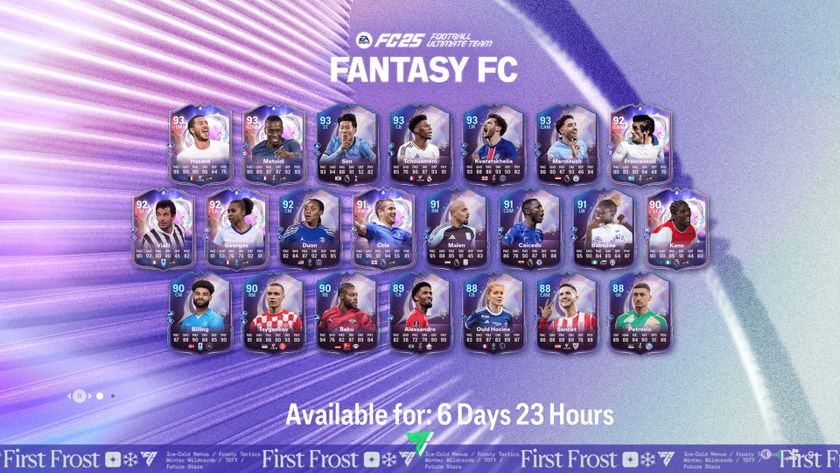12DOVE Verdict
Marvel's Spider-Man 2 improves on its predecessor across the board, while saluting the superhero genre over the last 30 years as a whole. With a captivating narrative and unrivaled spectacle, it's the quintessential superhero game, in story and mechanical terms
Pros
- +
It is drop dead gorgeous
- +
Its gorgeous slant on NYC is bursting with life
- +
Combat and traversal is more fun than ever
Cons
- -
Pacing in its final third is a little inconsistent
Why you can trust 12DOVE
About two thirds of my way through Marvel's Spider-Man 2, I found myself clinging to the side of a Manhattan skyscraper. It was a nondescript office block – made of limestone and granite, a few streets over from the Empire State Building in the borough's midtown district – illuminated by the low sun reflecting off the nearby Hudson River. I was between missions, and despite a new main quest map marker pointing me in the direction of Queens across the water, I was lost in the moment, peering into the cluttered workspace of an unassuming civilian on the opposite side of the glass.
By now, it should go without saying that Insomniac Games knows a thing or two about superhero spectacle. Our Marvel's Spider-Man review billed Peter Parker's maiden voyage under this developer's care as "about as good as superhero gaming gets." Fast forward five years and a new console generation, and I can say with absolute certainty that Marvel's Spider-Man 2 is as good as superhero gaming gets. It's the quintessential costume caper, larger than life in more ways than one, and whose blockbuster boss battles and mob-fighting forays have set new standards in not just superhero games, but AAA action-adventure games in general moving forward.
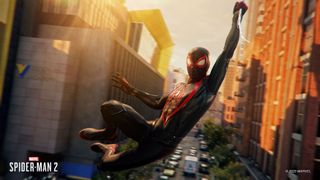
Release date: October 20, 2023
Platform: PS5
Developer: Insomniac Games
Publisher: Sony Interactive Entertainment
Marvel's Spider-Man 2's busiest moments, though, are accentuated by its quietest. The Manhattan map of the original 2018 outing was a triumph in open-world design, but that game's bustling thoroughfares and scaled interpretations of NYC's busiest tourist spots feel empty in comparison to its (exclusively) PS5-powered sequel. Here, we're seeing the true potential of Sony's cutting-edge hardware, spread across an enhanced version of Manhattan and Harlem, as well as Brooklyn, Queens, and Coney Island for the very first time. In practice, this means more yellow cabs slouching down Fifth Avenue at rush hour, more holidaymakers snapping selfies at Times Square, and, as evidenced by my off-hand nosiness above, more subtle suggestions that this virtual sprawl is alive away from the action.
The idea that a video game setting can be so well-designed that it can be considered a central character is a well-worn cliche – but I genuinely can't think of any game I've ever played in recent years where the assertion is more true. In Marvel's Spider-Man 2, every journey to and from each breakneck action set-piece feels satisfying, it feels credible, it feels, almost, real. Despite the fact that, you know, you're dressed in increasingly outlandish spandex costumes, and shooting fake spider webs from devices attached to your wrists en-route to fight a giant man made of literal sand. And, of course, while Marvel's Spider-Man 2 shines in its down time, it absolutely thrives in its moments of carnage.
There goes the neighborhood
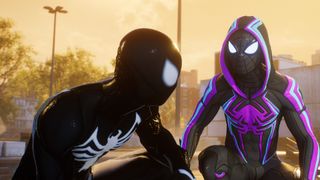
That's likely best showcased when the game's duo of spider men – Peter Parker and Miles Morales – join forces in the throes of fast and furious combat. Following his support act appearance in the first Marvel's Spider-Man, Miles Morales was treated to a full-fledged spin-off in 2020, an expansion that further explored the character's unique story and style. In Marvel's Spider-Man 2, however, both Peter and Miles are fully playable characters, each with their own stakes in the overarching central narrative, and each with their own tailored off-shoot side quests.
Outside of core missions, switching involves swiping left on the DualSense touchpad and selecting sub-quests dedicated to each character, hitting X, and watching a quick fade-to-black transition change things up almost instantly. When teamed up in combat, you'll control one Spider-Man with the other offering AI support – either locking horns with individual enemies elsewhere in whichever conflict you've wound up in this time, or assisting in picture-perfect, slow motion, double-team takedowns.
Surviving these hectic wave-based battle royales requires fast reflexes – flitting between attacks with the square button, dodging with circle, and pulling yourself towards the nearest enemy with triangle – and executing special abilities at the perfect moment. Unlike the first game, these abilities are no longer tied to specific suits, but are instead assigned via the pause menu. Mixing and matching your favorites is essential in ascertaining what works best and is most effective for you, as is strategizing the order in which you perform them.
My own preferred Miles combo, for example, saw me kick things off with a blast of Reverse Flux that floored enemies, before quickly doubling down with a hit of Chain Lightning. This, more often than not, weeded out the weakest enemies of the pack, which let me then follow-up on the big guns with Thunder Burst and Galvanise: the first, a devastating area-of-effect maneuver; the second, a focused blow that sends one enemy airborne, while also dealing nearby enemies damage too. A cooldown timer governs all of the above, underlining the importance of timing in battle, whereas regular attacks build your focus bar. Only after maxing that out can you either heal or enact the aforementioned slo-mo takedowns, either solo or with your spider-pal in tow.
Does it come in black?

A suite of skills, gadgets, and suit tech options likewise complement the more flexible combat systems, with improvements unlocked with skill points accrued by winning battles, and uncovering secrets out on the field. Peter and Miles each have their own individual traits that aid them in combat, while a third tier of shared unlockable skills offer more generalized leg-ups – both in battle and while traversing New York City.
The latter means of travel is now bolstered by the inclusion of a 'web wing' wingsuit that lets you glide through the skies at any height, as opposed to swinging from platforms above. This is especially helpful when making the journey over the East River towards Queens and Brooklyn, whereby catching wind tunnels – delineated on-screen by glowing rings – and updrafts around skyscrapers and industrial air vents helps to maintain aerial momentum, forcing a degree of light puzzle work in getting around that I enjoyed moment-to-moment.
As for the spider suits themselves, Marvel's Spider-Man 2 boasts 66 in total (34 for Peter, and 32 for Miles), each of which is a nod to a specific era or story thread in Spider-Man's storied multimedia lineage. One of those, of course, is the symbiote suit. And while it's impossible to properly dig into why this is so special here without spoiling some pretty key narrative beats, know that it is special.
Kraven the Hunter marks Marvel's Spider-Man 2's central antagonist, with some of the best Spider-Man villains – from Sandman to The Lizard, Scorpion, Mysterio, The Prowler, Tombstone, Mister Negative, Scream, Venom, and more – all showing face in various capacities throughout, meaning Peter and Miles really do have their work cut out for them this time around. And, inspired by the symbiote suit, Peter makes especially light work of it all with a library of OP abilities that'll satisfy any fan's power fantasies. Shooting a web of tendrils from the suit, grabbing half-a-dozen enemies by the skull and slamming them into the concrete simultaneously never, ever, gets old.
Great possibility
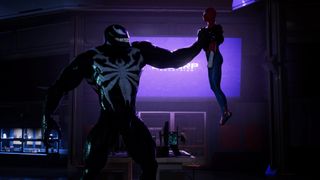
Marvel's Spider-Man 2 also includes a pretty comprehensive suite of accessibility options. I can't speak to their helpfulness directly, but I can say the game includes: Hearing Presets, which let players enable subtitles, make adjustments to the color of subtitle speakers and subtitle background opacity, and tweak music volume and vibration settings. The game includes Motion Sensitivity Presets, that enables a 'slow corner timescale' and 'center dot'; and disables things like camera shake, motion blur, depth of field, and swing camera motion. It includes Motor Presets that aid aiming, melee, and parkour mode; and enables things like continuous dodge, enhanced auto aim, and QTE autocomplete. And it includes Vision Presets, that enable things like auto-heal, chase assist, and waypoint navigation.
With navigation in mind, unlocking the world's various districts is a far more organic process in Marvel's Spider-Man 2 compared to its forerunner, with discovery hinged on simply physically entering areas, as opposed to the first game's Far Cry-esque comms tower interactions. Like its predecessor, the Marvel's Spider-Man 2 map is littered with extracurricular activities away from the main quest, that take the shape of designated photo ops, raidable enemy gang headquarters, randomly-generated crime scenes, and time trial-style puzzles, each of which offers a predetermined amount of tokens used to unlock skills, suit tech, gadgets, and more. For a sense of scale, I'd completed less than 50% of the game in its entirety after beating its Story Mode, meaning there's loads more to dig into after the credits roll.
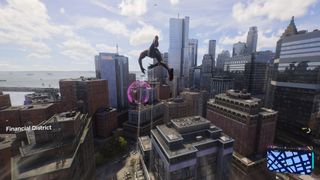
As it turns out, my only notable criticism of Marvel's Spider-Man 2 is tied to this very point. Despite being succinctly-paced throughout its first and second acts, the game's third act struggles to maintain the same consistency in tension and momentum. That's not to say it lacks either, but, similar to the likes of The Last of Us 2, there's a section towards the end where I was sure I was nearing the final scene, before it lulled, then hit the roof and dialed everything up to 11, from that point onto its climax. The choice puzzled me a little, but it's perhaps reflective of a wider issue pertaining to sequels in 2023, whereby value is unreasonable tied to the length of games, and wherein devs feel under pressure to go bigger and bolder at any cost.
I'm speculating, of course, and all of this matters a lot less when a game like this backs it up with quality across the board. Through all of this, I reckon Marvel's Spider-Man 2 does something few game sequels are capable of – it feels fresh and new, innovative and expansive, and familiar and deferential all at once; constantly shocking and inspiring awe, all the while tilting its cap to decades of inspiration from one second to the next.
PlayStation Studios and Insomniac Games' much-anticipated follow-up, then, is the result of years of evolution and iteration, both from Insomniac Games itself, and within the wider superhero action-adventure genre. And it shows. Just about everything here is an improvement over the original game. The combat and gadgetry is a tangible, if sometimes shameless homage to Rocksteady's Batman: Arkham series. And the breakneck traversal is a tribute to anyone with a passing interest in the subject matter, or anyone else who's ever dreamt of saving the world or defying gravity by flying through the skies. Marvel's Spider-Man 2 is, quite simply, the best superhero game yet.
Disclaimer
Marvel's Spider-Man 2 was reviewed on PS5, with code provided by the publisher.
More info
| Genre | Adventure |

Joe Donnelly is a sports editor from Glasgow and former features editor at 12DOVE. A mental health advocate, Joe has written about video games and mental health for The Guardian, New Statesman, VICE, PC Gamer and many more, and believes the interactive nature of video games makes them uniquely placed to educate and inform. His book Checkpoint considers the complex intersections of video games and mental health, and was shortlisted for Scotland's National Book of the Year for non-fiction in 2021. As familiar with the streets of Los Santos as he is the west of Scotland, Joe can often be found living his best and worst lives in GTA Online and its PC role-playing scene.
Most Popular






